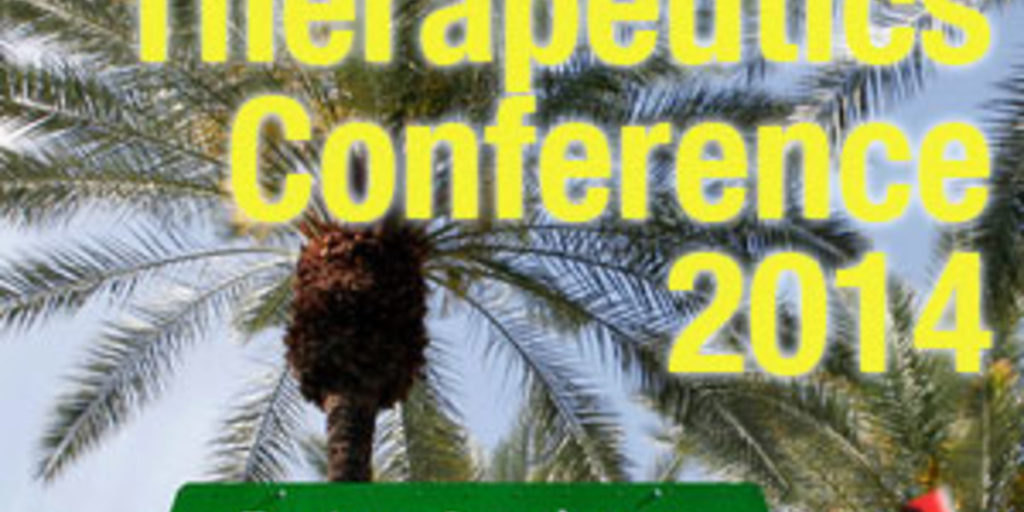The Huntington’s Disease Therapeutics Conference, held annually, is the biggest meeting of scientists working towards treatments for HD. Here’s our report from the opening day of science sessions at the Conference.
Morning session: New Target Opportunities
09:05 – Good morning from the Huntington’s Disease Therapeutics Conference in Palm Springs. Ed & Jeff tweeting today’s science sessions
09:07 – The first session is about ‘novel targets’. For drug hunters, a target is anything a drug might be able to alter, in order to treat HD
09:11 – Dan Lavery, of CHDI, says that more than 80 pharmaceutical and biotech companies have expressed interest in HD therapeutics
09:15 – William Yang, UCLA, kicks off the science talks by asking some provocative questions like ‘why does HD take 30-40 years to develop?’
09:20 – One problem scientists face is that there are too many targets to choose from! Lots of things go wrong in cells that have the mutation
09:21 – The ‘front’ end of the huntingtin protein – called the ‘N-terminal region’ – appears to be the most harmful bit.
09:21 – The N terminal region of huntingtin contains the expanded CAG mutation, and controls how the protein behaves in cells
09:26 – Yang’s group is making new lines of HD mice to test specific ideas about how N-terminal modifications affect disease progression
09:31 – Just chopping off the N-terminal end of the HD protein makes their HD symptoms remarkably worse
09:36 – Yang’s group is also interested in understanding how normal aging processes affect the progression of HD
09:39 – One thing that happens in aging is DNA damage, which is bad for cells. This type of damage is accelerated in HD, does this matter?
09:41 – Yang’s lab is using mice deficient in specific DNA repair pathways to test the idea that DNA damage might contribute to HD
09:52 – Surprisingly, partially reducing levels of one DNA damage gene seems to make HD mice a bit better
09:56 – As if genetics weren’t complicated enough, Ernest Fraenkel of MIT, is interested in “epigenetic” changes in HD
09:58 – “Epigenetics” is the study of how cells turn specific genes on and off using small chemical flags stuck on DNA
09:59 – Fraenkel’s group has found widespread changes in “DNA programming” in cells with HD mutations, opening new avenues for research
10:11 – The altered “epigenetic” programming observed by Fraenkel’s group might help explain changes observed in gene regulation in HD
10:19 – Frankel’s lab is also working to develop computer techniques to help scientists make sense of HUGE sets of data
11:06 – As computational technology has improved, HD researchers have found themselves swimming in data from patients and animal models
11:09 – Jim Rosinski, of CHDI, is a computational expert specializing in making sense of “big data” for HD scientists
11:15 – Rosinski: we need to measure as much as possible from model systems and people, if we hope to understand how the mutation causes harm
11:16 – Rosinski: there’s optimism that making small changes in chemistry and biology in patients could produce big benefits over the lifetime
11:21 – Rosinski is using state-of-the art techniques to study lots of mice with different HD mutation lengths, throughout their lifetimes
11:22 – One technique used is ‘RNA sequencing’, looking at which genes are switched ‘on’ and ‘off’ as the life of an HD model mouse progresses
11:24 – As expected, the biggest predictor of gene activation changes was CAG repeat length.
11:27 – The striatum (the part of the brain most affected early in HD) showed the most genes with altered expression in Jim’s mice
11:34 – When multiple related genes have altered switching, we can get clues as to what functions in cells are changed in HD
11:36 – Rosinski: surprising gene regulation changes were seen in the liver in HD model mice
11:40 – Excitingly, Rosinski revealed that the huge datasets generated are open for anyone who wants to use them. Cool open science!
11:41 – Any scientist who wants to have a crack at analyzing this huge dataset can fetch it at: http://chdifoundation.org/?page_id=911
11:43 – Long time HD researcher Jim Gusella addresses the conference on his 20 year effort to look for “genetic modifiers” of HD symptom onset
11:44 – A “genetic modifier” is a genetic sequence change that makes a person experience an earlier or later onset of HD symptoms
11:45 – Though HD is always caused by mutation in the HD gene, changes in other genes can influence how quickly disease develops
11:47 – Across our whole genome, sequence changes are observed in 1 in every 1000 “base pairs” of the DNA code
11:49 – Gusella is leading a “Genome Wide Association Study”, looking across the entire genome for variations influencing HD symptom onset
11:53 – Many “genetic modifier” studies have been done looking for connections between variation in individual genes and HD symptoms
11:54 – Gusella suggests these early studies haven’t stood up to scruitny, and that a more holistic approach is needed
12:00 – The question Gusella and colleagues are asking: “are there any genetic variations that make people have earlier or later onset of HD?”
12:02 – To look for an answer, they’re using sequence information from huge numbers of HD patients and studies: COHORT, REGISTRY, PREDICT, …
12:03 – Over 4,050 HD subjects DNA was analyzed for this study! This shows the importance of research participation by many HD families
12:04 – Gusella reports he believes they’ve found traces of the first valid modifier of HD age of onset
12:08 – This could be a powerful tool: finer mapping of this sequence variation will give scientists new insights about how HD progresses
12:11 – It’s not yet clear what specific gene modifies HD age of onset, but this evidence gets us very close to figuring that out
Afternoon session: Novel Therapeutic Approaches
14:17 – Jan Vesper, a neurosurgeon from Germany, describes his work applying a technique called “deep brain stimulation (DBS)” in HD patients
14:18 – DBS uses tiny electrodes to stimulate specific brain regions, read about it on HDBuzz at: http://en.hdbuzz.net/102
14:25 – Vesper is conducting a clinical trial of DBS in 6 HD patients to see if this approach is beneficial for the motor symptoms of HD
14:35 – Early results suggest there might be a benefit for movement symptoms, but more work is needed, as the technique is complex
14:36 – Based on these early results, a larger study is planned to investigate DBS in HD across multiple study sites
14:42 – This DBS study is getting started in Europe now, and will use 20 patients to have a better sense of how benficial it is in HD
14:57 – Gill Bates is interested in changes in muscle tissue in HD, using mouse models to study changes that accompany disease
15:00 – HD mice have problems with their muscles, and limited information from HD patients suggest theirs are changing too
15:03 – One benefit of understanding muscle problems in HD is that they may be more accessible for treatment compared to the brain
15:06 – Bates' team is working with an expert in drugs that bolster muscles. These drugs are beneficial in her HD mice
15:09 – Treated mice maintain their grip strength and do not lose as much weight as untreated HD mice
15:25 – Bates: several drugs being tested in other diseases might have similar effects to the muscle drug she tested in her HD mice
15:26 – Bates: muscle in HD is an unknown quantity, so the possible benefits of this approach are difficult to predict
16:10 – Chris Colwell of UCLA is talking about ‘circadian rhythm’ – that’s the body’s ability to regulate things according to day and night
16:11 – Some circadian rhythms, like sleeping and waking, are obvious. Others, like hormonal changes, are less so.
16:13 – Other circadian rhythms include changes in body temperature, heart rate and blood pressure
16:14 – Many circadian rhythms go wrong in Huntington’s disease model mice – and in human patients, too.
16:17 – Many circadian rhythms also get less reliable with normal ageing. So the changes in HD might be exaggerated forms of that. .
16:19 – The brain controls circadian rhythms using electrical & chemical signals. HD mice brains can’t generate the normal electrical rhythms
16:21 – It’s not yet clear why circadian rhythms fade early in HD brains. But these changes could be important, and potentially treatable.
16:23 – Other organs like the liver, kidney and lungs have circadian rhythms too. They’re controlled by the brain
16:23 – These ‘peripheral’ organ clocks might also become disordered in HD through the action of the HD gene, which is present in every cell.
16:29 – Here are some HDBuzz articles on sleep and HD: http://en.hdbuzz.net/120 and http://en.hdbuzz.net/115
16:34 – Here’s our article on melatonin in HD, a possible treatment for sleep problems. It’s a brain hormone, reduced in HD http://en.hdbuzz.net/057
16:43 – Today’s final speaker is Beth Stevens of Boston Children’s Hospital.
16:43 – Stevens studies synapses – the connections between neurons.
16:44 – There are unexpected connections between synapses and the immune system
16:46 – Chemicals called ‘complement proteins’, which are involved in the immune system, also control the formation of synapses
16:47 – Synapses are being formed and broken all the time in our brains and in HD the process goes wrong.
16:49 – An important part of the brain’s development is ‘pruning’ of unwanted synapses.
16:49 – In part, the pruning of synapses is controlled by the electrical activity of neurons. Connections that are used are likely to survive.
16:52 – The actual disconnection of unwanted synapses is controlled at the molecular level by a complement protein called C1q.
16:54 – Microglia, the brain’s immune cells, can produce C1q. It’s actually used to fight unwanted invaders like bacteria.
16:55 – But C1q can also ‘tag’ the synapses that need to be eliminated.
16:59 – Once tagged by C1q, the microglia come along and eat up the unwanted synapses.
17:04 – What has this got to do with HD? We know there’s too much complement in HD brains. Could that be contributing to synapse problems?
17:05 – Microglia misbehave in HD, too – they’re overactive. Could that lead to synapses being eaten up incorrectly?
17:06 – Stevens is now studying microglia and complement proteins in Huntington’s disease mouse models.
17:09 – Is the complement protein in HD mouse brains targeting the most vulnerable cells and accelerating damage?
17:12 – Stevens: It seems that complement proteins sticking to synapses in HD mouse brain is indeed linked to the loss of synapses.
17:13 – Stevens: this link between the immune system and synapses in HD suggests that trying to restore normal immune function might be useful
17:15 – Stevens has developed new ways to study and measure the interactions between complement, microglia and synapses in HD
Sunset conclusions
Today was full of exhilarating science. Years of groundwork in the clinic and in the lab are coming to fruition, and it’s clear that the pace of HD research is ever increasing. After nearly 20 years of work, researchers have been able to analyze sufficient numbers of HD patients to start reliably identifying genes whose variation contributes to the age of onset of HD. Remarkably, today we saw an enormous set of HD data released to the internet for anyone to analyze. Scientists looking at HD throughout the entire body, not just the brain, providing hope for novel therapeutic interventions. Tomorrow’s schedule looks just as exciting, so watch for another update tomorrow night!







